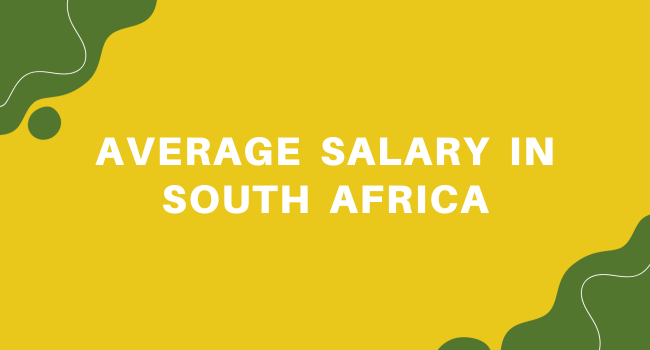Check out the details about Average Salary in South Africa: What is the Average Salary in South Africa this year? from this article. Various information on Average Salary in South Africa: What is the Average Salary in South Africa this year? and other relevant details are included in this article.
Average Salary in South Africa
Average salary is the mean income of employed individuals in a country. To calculate the average salary of any country, individuals can sum the annual salaries and divide it by the total number of workers.
The information provided by various sources on the Average Salary in South Africa can be different from one another. This is because there are a number of crucial factors that can affect the salaries of a worker, and they can increase or decrease according to the economic situation and inflation rate.
|
Important Links |
What is the Average Salary in South Africa this year?
The average salary in South Africa ranges from about R25,304 to R31,100 per month. These numbers can be different if we talk about weekly, bi-weekly, or annually. Moreover, the average salary for a particular sector can also be different from other sectors.

Many aspects, such as inflation, type of employment, labour laws, cost of living, demand/supply, location of employment, and other relevant factors, can contribute to the changes in the average salary in South Africa.
Please note that the average salaries of a country do not remain the same every year, or in some cases, every month. Depending on the aforementioned factors, the average salaries can fluctuate, i.e., increase or decrease.
If we consider the average salary of different jobs in South Africa, there will be noticeable variations. For example, the average salary for Architecture & Creative Arts is about R 41,829, whereas the average salary for Construction & Maintenance is about R27,551.
South Africa Average Salary
As we can see, both job sectors have substantial dissimilarities in the average salaries. Please note that the salaries of the people working in these job sectors can also have different salaries depending on the type of employer, experience, etc.
Jobs associated with banking, finance, education, and science usually have higher average salaries. The number of workers and the locations from which the salary data is obtained can significantly change the numbers.
This is because if a location has a good economic situation and the data is obtained from a small number of employees, it is likely to reflect higher average salaries. In contrast, if the data is taken from a larger group of the population, the average salary will become different from the previously computed salary.
If the average salary of a country is high, it means that more workers from the working population of that country are earning a good income. In contrast, if the average salary decreases, it means that more workers from the working population are earning lesser amounts than they did before.
The current inflation rate in South Africa is 5.4% (as of September 2024). This month saw a sudden hike in inflation from 4.8% and 4.7% in August and July, respectively. With inflation comes many changes, mostly negative ones. Some sectors can see some benefits from the increased inflation, while a larger portion of the sectors can suffer adverse effects depending on the impact.
Factors Affecting Average Salary
Several factors play a substantial role in changing the average salary of a country. These can be the location of employment, skills, cost of living, wage policy, etc.
|
Important Links |
A country’s average salary can be influenced by the minimum wage and wage laws. This is because if an employer typically pays their workers the minimum wage, any changes to the minimum wage can have an impact on the average salary.
In addition, the rate of increment in the salary in different sectors can also change the average salary. If a particular sector has a high increment policy, the average salary of that sector is likely to become higher with the increment.
A worker having in-demand skills and good experience is likely to have a higher salary than others, provided that they are doing the same job. Furthermore, a person with a higher degree is also likely to get higher pay.
The place where the workers work, i.e., location (city/country), can also have an impact on the average salary. This is because the average salaries in some locations are higher than in others.







